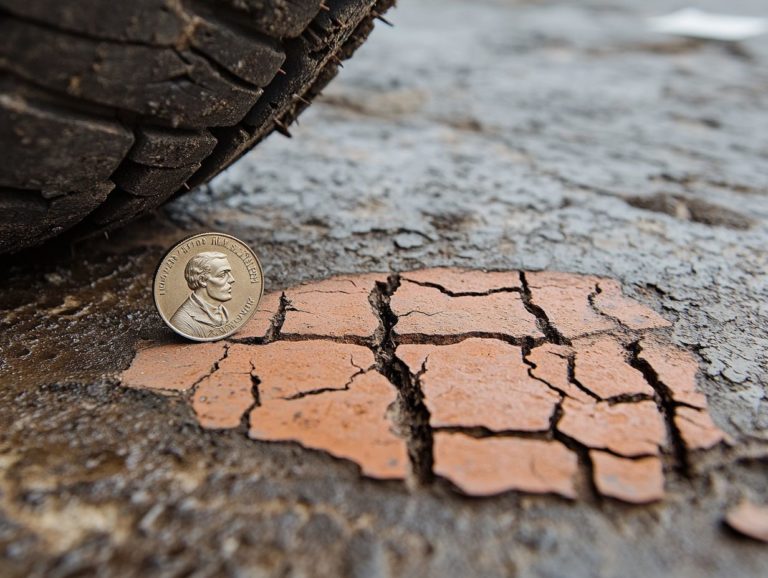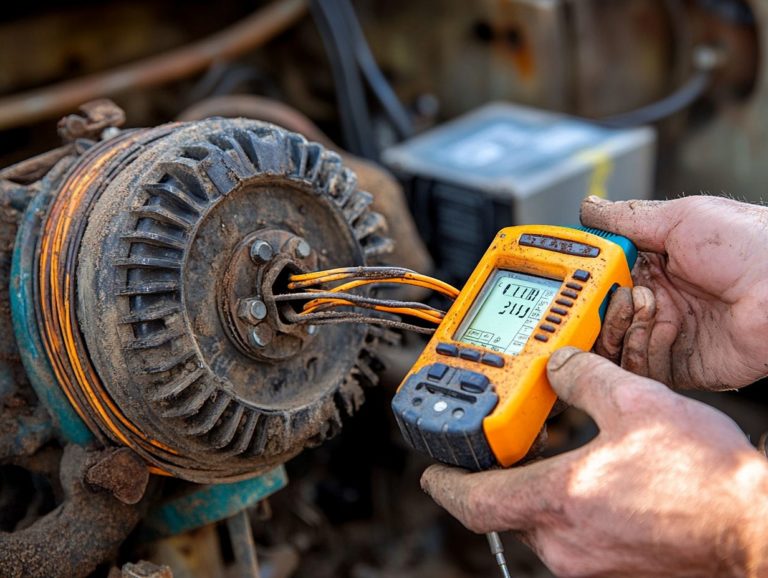How to Know If Your Car Needs a New Exhaust?
Understanding your car’s exhaust system is vital for maintaining optimal performance and ensuring a smooth, efficient ride.
This article delves into the key components and functions of the exhaust system. It enables you to identify signs of failure and common causes of issues. You will also find practical tips to extend its lifespan, making it crucial for keeping your car running smoothly and safely!
Contents
Key Takeaways:
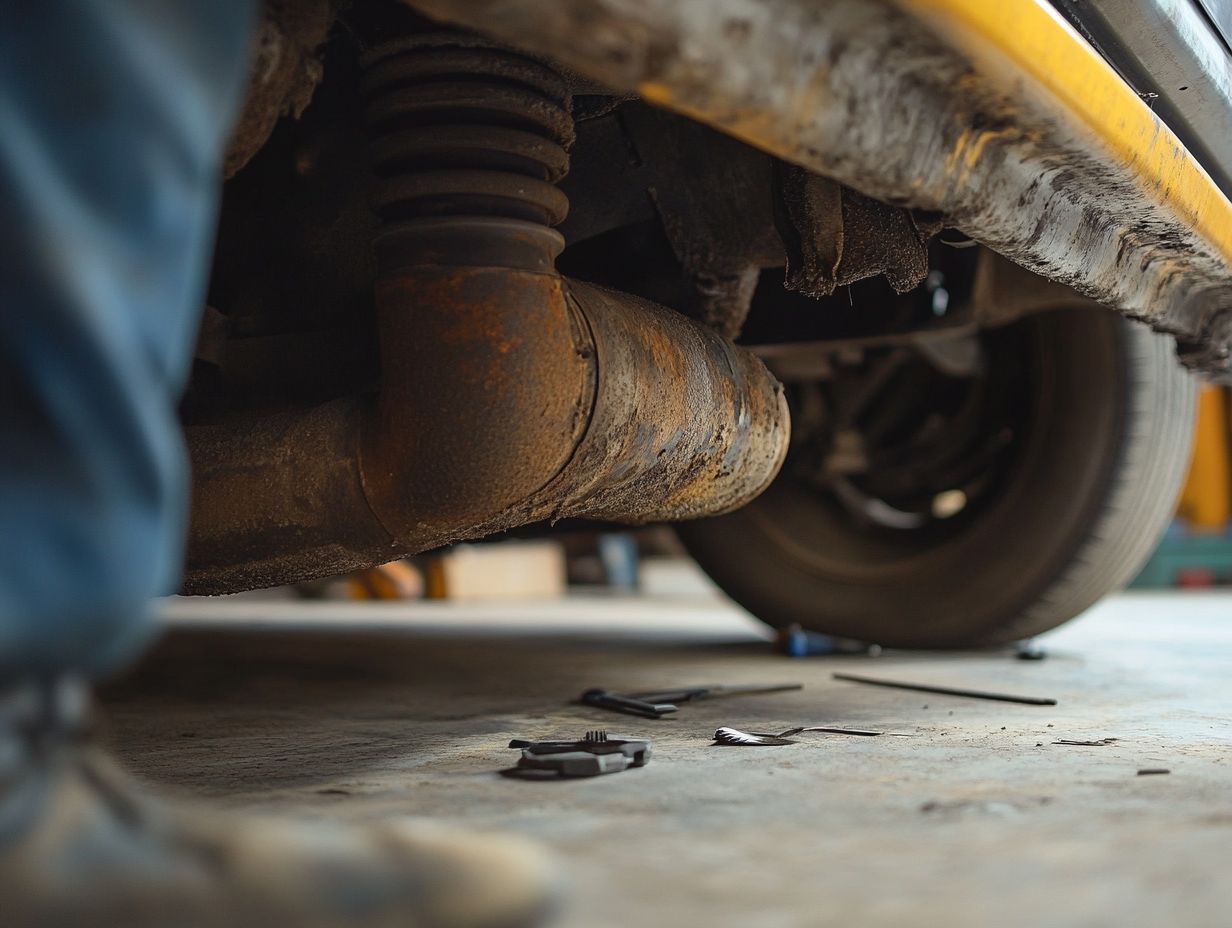
- Inspect your exhaust system regularly to prevent costly repairs.
- Look for loud noises and reduced fuel efficiency; it might be time for a replacement.
- Maintain your system with quality parts to extend its lifespan.
Understanding Your Car’s Exhaust System
Understanding your car s exhaust system is essential for achieving optimal performance and meeting emissions regulations. This system consists of several key components, including the exhaust manifold, catalytic converter (a part that helps clean exhaust gases), oxygen sensor, and muffler.
Together, they help safely expel exhaust gases and minimize harmful emissions. By committing to regular vehicle maintenance, you can prevent exhaust issues, enhance fuel economy, and boost overall engine performance.
This not only ensures a smoother ride but also extends the lifespan of your car’s exhaust components.
Components and Functions
The exhaust system comprises several key components, including the exhaust manifold, catalytic converter, exhaust pipe, and muffler. Every part helps your engine run better and reduces emissions.
The exhaust manifold collects exhaust gases from the engine cylinders, ensuring an efficient flow while minimizing back pressure essential for optimal engine performance. The catalytic converter transforms harmful pollutants into less damaging emissions, significantly improving air quality.
The exhaust pipe transports these gases away from your vehicle, preventing leaks. The muffler reduces engine noise, enhancing your driving experience without sacrificing functionality.
Regular inspections of these components are vital to ensure peak exhaust performance and uphold vehicle safety standards. This focus ultimately contributes to reducing the environmental impact of emissions.
Signs of a Failing Exhaust System
Recognizing the signs of a failing exhaust system is crucial for safeguarding your investment and ensuring your vehicle’s safety. Pay attention to common symptoms such as unusual engine noise, vibrations, and the check engine light lighting up these can all indicate exhaust issues like leaks or muffler damage.
By detecting these problems early through thorough exhaust diagnostics, you can save yourself from more extensive and costly repairs later. Taking proactive steps now will enhance your driving experience and prolong the lifespan of your vehicle.
Identifying Common Symptoms
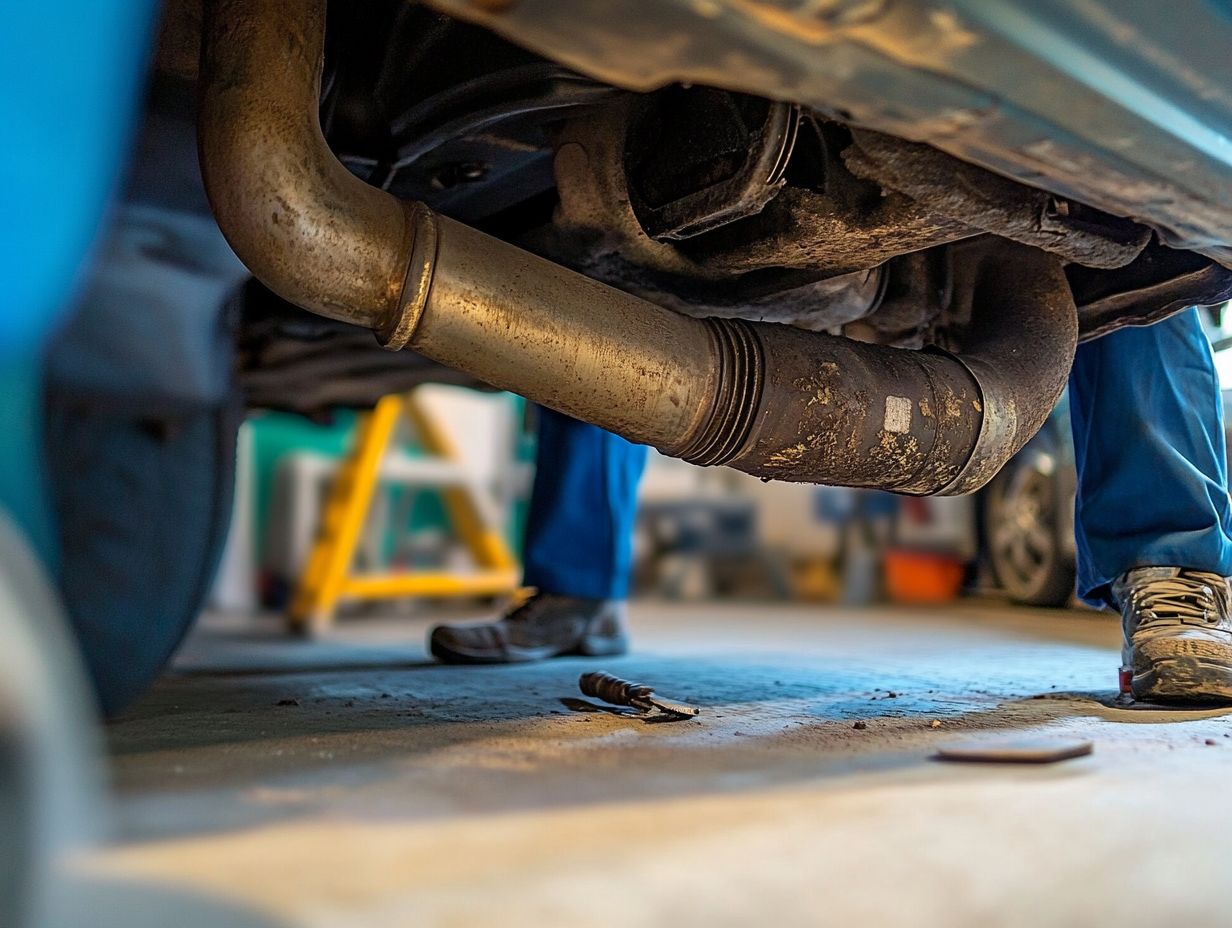
Common symptoms of exhaust system failure include persistent engine noise, vibrations during acceleration, and that pesky check engine light lighting up each a potential indicator of serious exhaust issues.
If you hear a loud rumbling or hissing sound, it could point to a faulty muffler, which is supposed to keep noise emissions in check. If those sounds are accompanied by noticeable vibrations, it might suggest an inadequate seal in the exhaust pipe or even hint at a deeper problem with the engine mounts.
If the check engine light comes on frequently, it may indicate that the oxygen sensors are misbehaving, leading to an improper fuel mixture and reduced engine performance.
Each of these symptoms is a critical alert, urging you to act swiftly to ensure both safety and efficiency on the road.
Causes of Exhaust System Failure
Understanding the causes of exhaust system failure is essential for maintaining your vehicle’s performance and longevity.
Common issues include:
- Rust corrosion that can affect exhaust pipes.
- Damage to the muffler from road debris.
- Problems with the exhaust manifold that may lead to exhaust leaks.
By conducting regular diagnostic tests, you can identify these issues early. This ensures timely repairs and optimal vehicle function.
Common Culprits and How to Avoid Them
Rust corrosion, exhaust leaks, and muffler damage are the usual suspects in exhaust system failures. These can dramatically impact your engine’s performance.
These problems often arise from exposure to harsh environmental conditions, prolonged moisture buildup, and the accumulation of road salt. All of these factors can undermine the integrity of your exhaust components over time.
To combat these risks, it’s vital to conduct regular inspections. Pay close attention to vulnerable areas where rust tends to form. Keeping your exhaust system clean with periodic washing can also help limit corrosion. Applying high-quality rust-resistant coatings provides an additional layer of protection.
Keeping seals and gaskets well-maintained can reduce the likelihood of leaks. This ultimately helps preserve the functionality of your entire system.
Replacing Your Car’s Exhaust System
Replacing your car’s exhaust system can significantly boost its exhaust performance. It also ensures compliance with emissions standards, especially if you re dealing with ongoing exhaust issues.
You have various options, ranging from original parts to custom exhaust systems designed for improved performance. By consulting with a professional mechanic, you can find the optimal solution tailored to your vehicle’s unique needs.
Determining When It’s Time for a Replacement
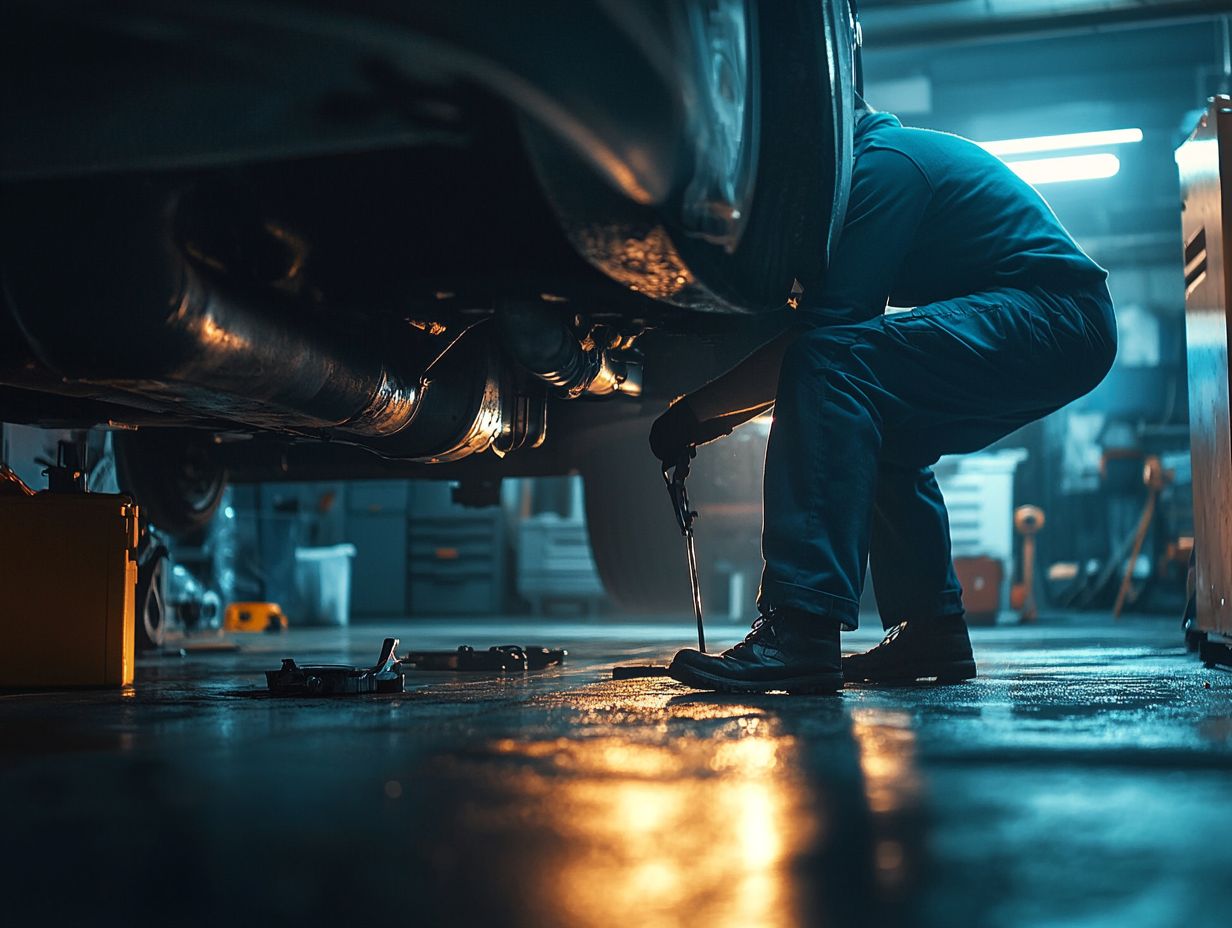
It’s essential to determine when to replace your car’s exhaust system. Look for signs of muffler damage or a dip in engine performance.
Don t ignore these issues; they could lead to serious problems later. If your vehicle starts emitting unusual noises or you notice a drop in fuel efficiency, it s time to seek a diagnostic assessment.
Performance indicators like increased engine temperature or failing emissions tests are red flags. They suggest that your exhaust system might not be operating at its best. By paying attention to these signals, you can prevent further damage and keep your vehicle running smoothly and efficiently.
Choosing the Right Exhaust System for Your Car
Choosing the right exhaust system for your car can significantly affect both performance and fuel efficiency. You have options, from standard replacements to custom systems designed for your specific driving style.
As you consider your choices, evaluate various factors. Think about your performance goals: Are you looking to boost horsepower, enhance torque, or just want that exhilarating aggressive sound?
Compatibility is another crucial aspect. Assess how the new system aligns with your existing components, such as headers and catalytic converters. Mismatched parts can lead to inefficiencies that you definitely want to avoid.
Additionally, the choice of materials matters. Stainless steel and aluminized steel offer different levels of durability and cost-effectiveness. Performance exhaust systems can improve fuel economy by minimizing back pressure and facilitating smoother airflow.
Ultimately, pinpointing the best exhaust system ensures that you achieve optimal performance enhancements, all customized to your individual driving preferences.
Maintaining Your Car’s Exhaust System
Maintaining your car’s exhaust system is crucial for ensuring optimal exhaust health and safeguarding your vehicle’s safety. Engage in regular vehicle maintenance, which includes thorough visual inspections and prompt repairs of any exhaust leaks or muffler issues.
This practice can significantly extend the lifespan of your exhaust system while enhancing overall engine performance.
Tips for Prolonging the Life of Your Exhaust System
Taking care of your exhaust system requires regular maintenance. Consistent diagnostics and prompt repairs for any leaks are crucial.
Regular inspections can help you catch potential issues before they escalate. This ensures that essential components like the catalytic converter and muffler stay in peak condition.
Pay attention to warning signs such as unusual noises or a dip in fuel efficiency; these could indicate deeper problems lurking beneath the surface.
Working with a knowledgeable technician for routine checks not only allows for timely diagnostics but also helps you take care of your car early. Plus, opting for high-quality materials during repairs can significantly enhance durability, providing long-term benefits for your entire exhaust system.
Frequently Asked Questions
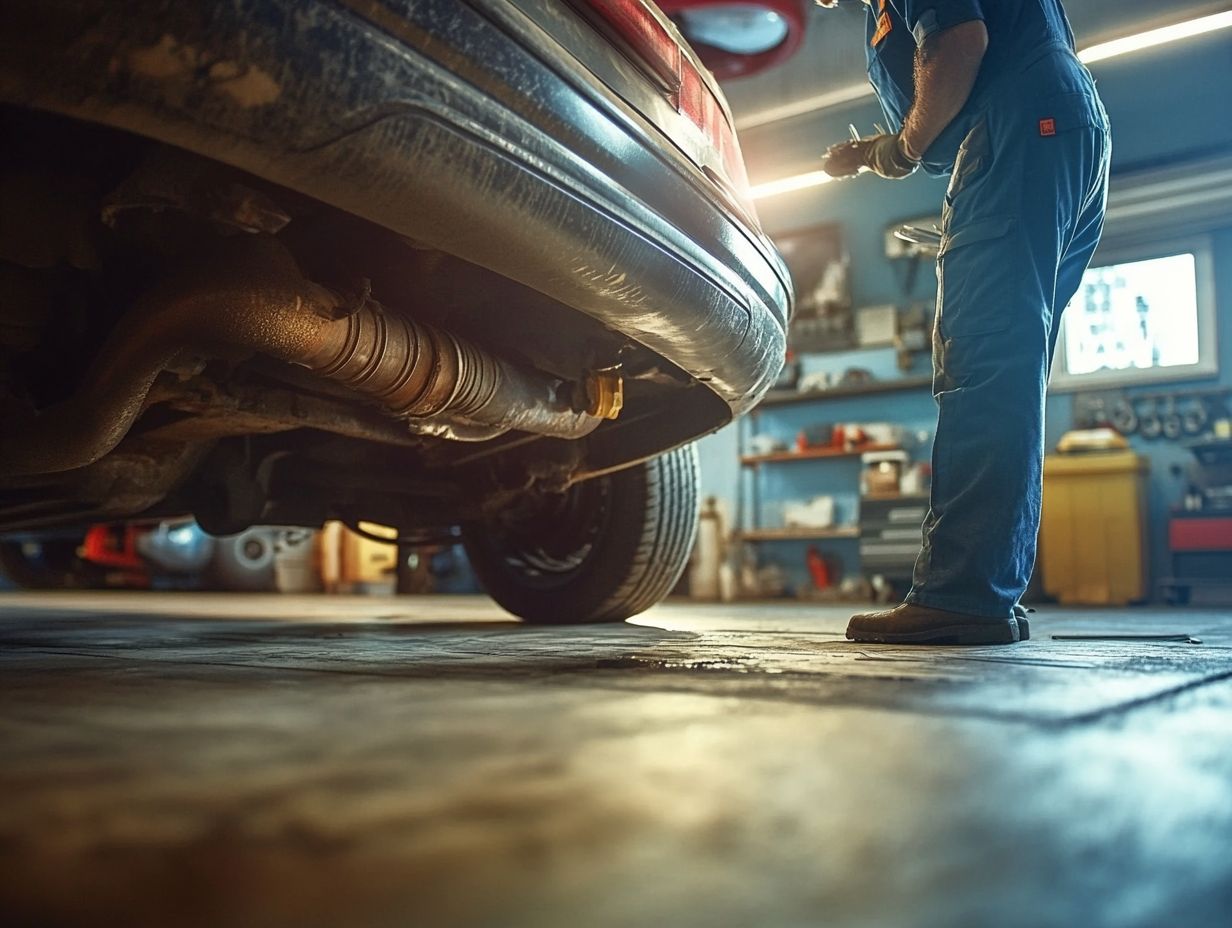
How to Know If Your Car Needs a New Exhaust?
If your car has been making strange noises or exhibiting other issues, it may be time to replace your exhaust. Here are some common questions about how to know if your car needs a new exhaust.
What are the signs that my car needs a new exhaust?
There are several signs that your car may need a new exhaust, including loud noises, rattling or shaking, decreased fuel efficiency, and a burning smell.
Spotting these signs? Don’t wait! Get your exhaust checked by a mechanic today!
How long does an exhaust usually last?
The lifespan of an exhaust can vary depending on the make and model of your car, as well as your driving habits. On average, an exhaust can last anywhere from 5 to 7 years before needing to be replaced.
Can I still drive my car if the exhaust needs to be replaced?
You might be able to drive your car for a while, but don t delay in getting that exhaust fixed! It’s important to have it repaired as soon as possible to avoid any potential safety hazards and further damage to your vehicle.
What happens if I continue driving with a faulty exhaust?
If you continue to drive with a faulty exhaust, it can lead to more serious issues with your car. Your engine may have to work harder, resulting in decreased fuel efficiency and potential damage.
A damaged exhaust can also release harmful emissions into the environment.
How much does it cost to replace an exhaust?
The cost of replacing an exhaust can vary depending on the make and model of your car, as well as the type of exhaust system you choose. On average, you can expect to pay anywhere from $500 to $1,500 for a new exhaust.
It’s best to consult with a mechanic for a more accurate estimate based on your specific car.
Take care of your car’s exhaust today for a smoother, safer ride tomorrow!


